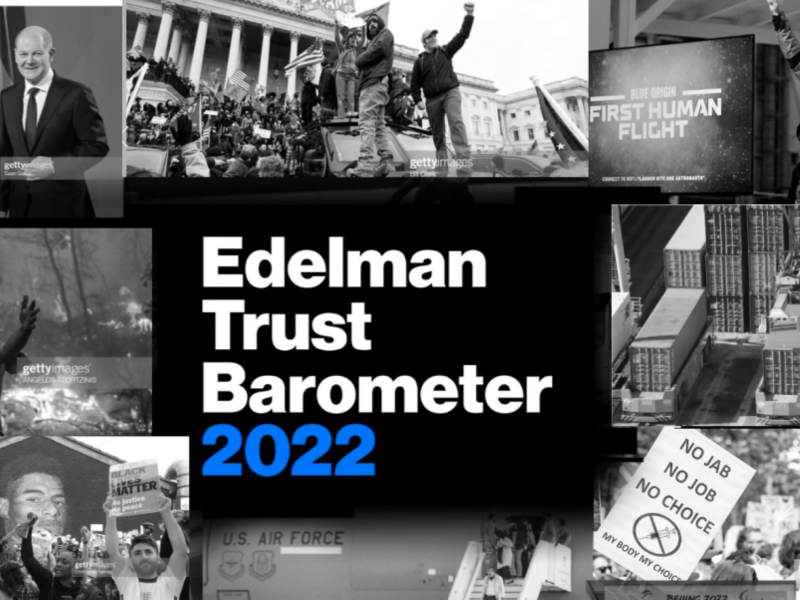Diana Marszalek 18 Jan 2022 // 5:00AM GMT

NEW YORK — The 2022 Edelman Trust Barometer finds faith in government and media continues to drop, perpetuating a cycle of distrust that “threatens societal stability.”
The survey of 36,000 consumers in 28 countries found 48% of respondents view government and 46% view media as divisive forces today, versus business and NGOs which fared better with 31% and 29% respectively.
On top of that, government leaders (42%) and journalists (46%) are the least trusted societal leaders, whereas people have the most confidence in coworkers (74%) and scientists (75%). Most respondents also believe that the government (66%, up nine points) and journalists (67%, up 8 points) are lying to them.
The numbers show a precipitous fall from grace for government, which was the most trusted institution in May 2020 but has dropped 13 points (from 65% to 52%) to third behind business (61%) and NGOs (59%). Only the media (50%) fared worse.
“Government is seen as less competent than business, and we are in a whole new game,” said Edelman CEO Richard Edelman. “We have very big problems and government isn’t seen as able to manage them.”
The collapse in government trust was particularly acute in developed democracies (not one reached a 60-point score), largely pinned to respondents in every one of those countries believing they will be worse off financially in five years — and 85% fear they will lose their jobs to factors including automation. The US ranks 43 in the trust index (a 10-point drop since 2017), 40 points lower than China, at 83.
52% of respondents said capitalism in its current form is doing more harm than good.
Distrust has become the default, with most respondents (59%) saying they tend to distrust until seeing evidence that something is trustworthy, and 64% believing people in their country lack the ability to have constructive and civil debates.
In turn, business, which is the most trusted institution for the second consecutive year, is under increased pressure to step up to fill the leadership void.
55% of respondents believe companies are best equipped to take a leadership role on societal issues and 65% believe in business’s ability to get results in doing so. Yet less than half of those surveyed believe government is effectively taking a leadership role (44%) or getting results (42%).
When considering a job, 60% of employees expect their CEO to speak out on controversial issues they care about and 81% of respondents want CEOs to be personally visible when discussing public policy or their companies’ work that benefits society. The study found 66% of respondents believe ‘my employer’ is the most believable source of information.
But respondents also believe business is not doing enough to address problems including climate change (52%), economic inequality (49%), trustworthy information (42%) and workforce reskilling (46%).
Business is also under pressure from all stakeholders: 58% will buy or advocate for brands based on their beliefs and values; 60% will choose a place to work based on their values and beliefs; 64% will invest based on their values and beliefs; and 88% of institutional investors subject ESG to the same scrutiny as operational and financial considerations.
All of which has created an over-reliance on business to fill the leadership void left by the government — a job companies are not built to do, Richard Edelman said. “It’s not sustainable in the long run,” he said.
Rather, Edelman said, it is a time for business to be a stabilizing force, and step up to tackle issues like wages, climate change, reskilling workers, and diversity — while trying to stay focused on policy and out of politics.
Other institutions seeking to restore public trust will have to follow suit. “Now is the time for action because action drives trust. Communications alone doesn’t drive trust,” Edelman said. “People need evidence that you are making the change.”
Other key findings include:
-
Over the past 10 years trust in all news sources dropped except for owned media (43%), which rose one point. Social media (37%) experienced the sharpest drop at eight points followed by traditional media (57%) at five points and search engines (59%) at three points.
-
Concerns over fake news and false information being used as a weapon is now at an all-time high of 76%.
-
Despite a drop in trust, most still expect government to lead the fight on major societal issues including Covid-19 vaccination (74%), climate change (65%), systemic injustice and discrimination (61%), and workforce reskilling (53%).
-
The 15-point trust gap between high-income individuals (62%) and low-income individuals (47%) matches an all-time high.
-
The political chasm in the US shows no signs of slowing down with a 31-point gap in trust in media between Democrats (55%) and Republicans (24%) and a 24-point gap in government, Democrats (53%) versus Republicans (29%).



































.jpg)


















